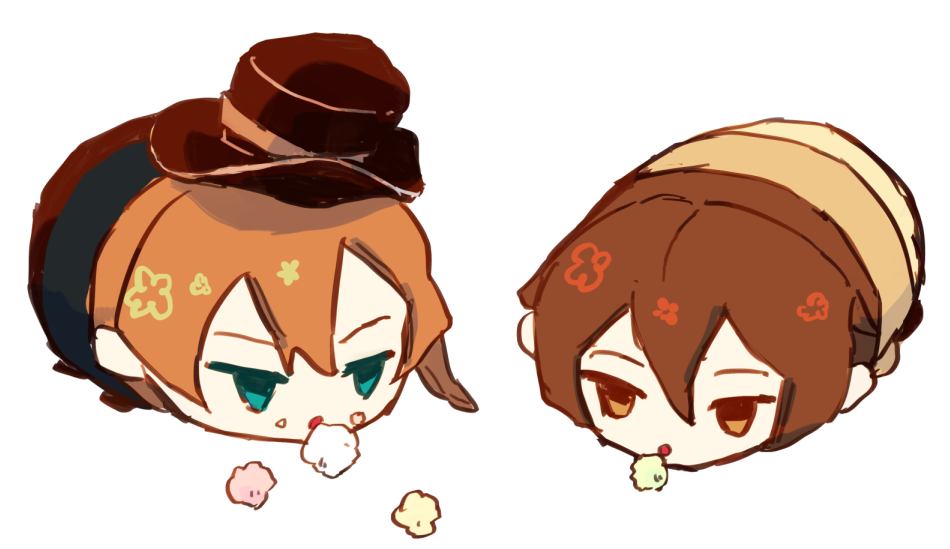Intro
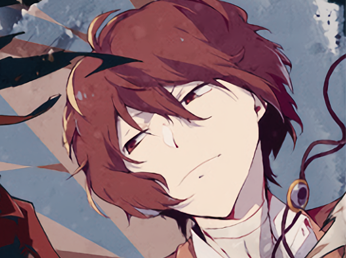
Bungou Stray Dogs
our story begins in December 2012 when, headed by writer Asagiri Kafka and illustrator Harukawa Sango, Bungou Stray Dogs (BSD) began serialisation in Kadokawa's seinen manga magazine Young Ace. it all goes downhill from there. following a trend perhaps popularised by Fate/Stay Night, the characters borrow the likenesses of historical celebrities— in this case, famous late authors. over time the cast expanded from only Japanese contemporaries to include literary greats from the world over. currently, BSD boasts 53 such characters, from Edogawa Ranpo to Agatha Christie.
in a 2016 interview, Asagiri confessed his hope for BSD to spark new interest in literature.[1] i hold a personal conspiracy theory that he was commissioned by the Japanese government to remind young animanga fanatics that real books exist. better yet that they're worth reading! but that is neither here nor there, and any passion for reading is a good thing in my eyes.
continuing on, it is important to note that BSD characters adopt not only the names and novels of their real-life counterparts but portions of their history as well. authors who knew each other typically maintain some connection within the show. interestingly, the roles in the relationship often undergo some kind of reversal— plainly seen where Dazai and Chuuya are concerned.
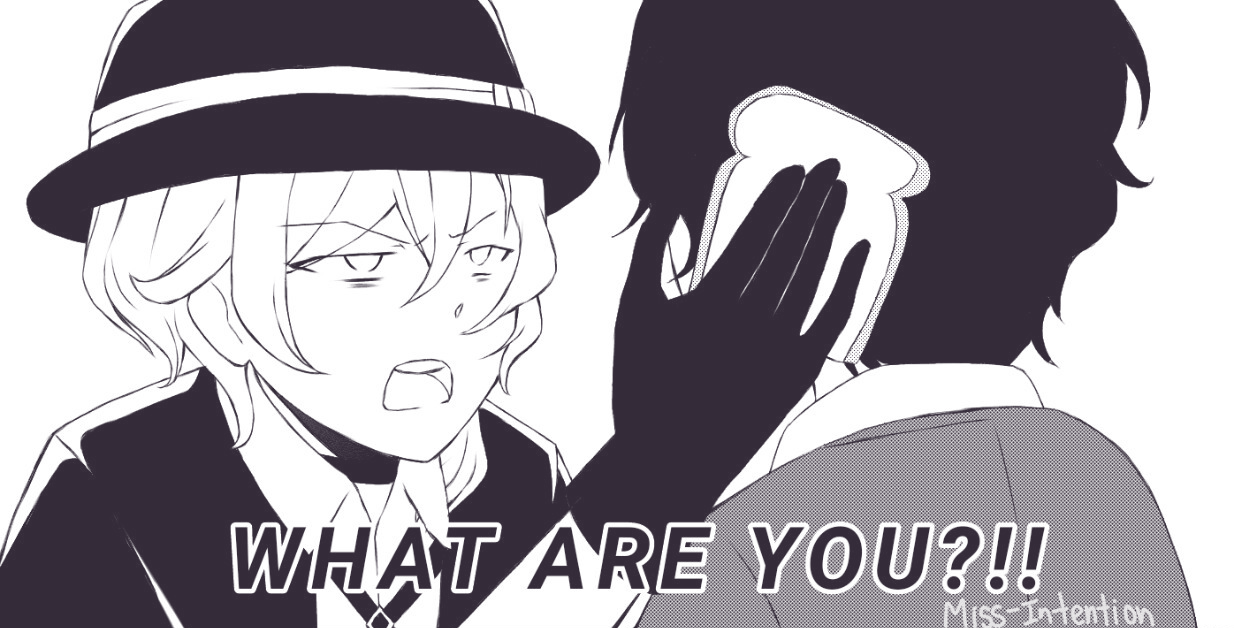
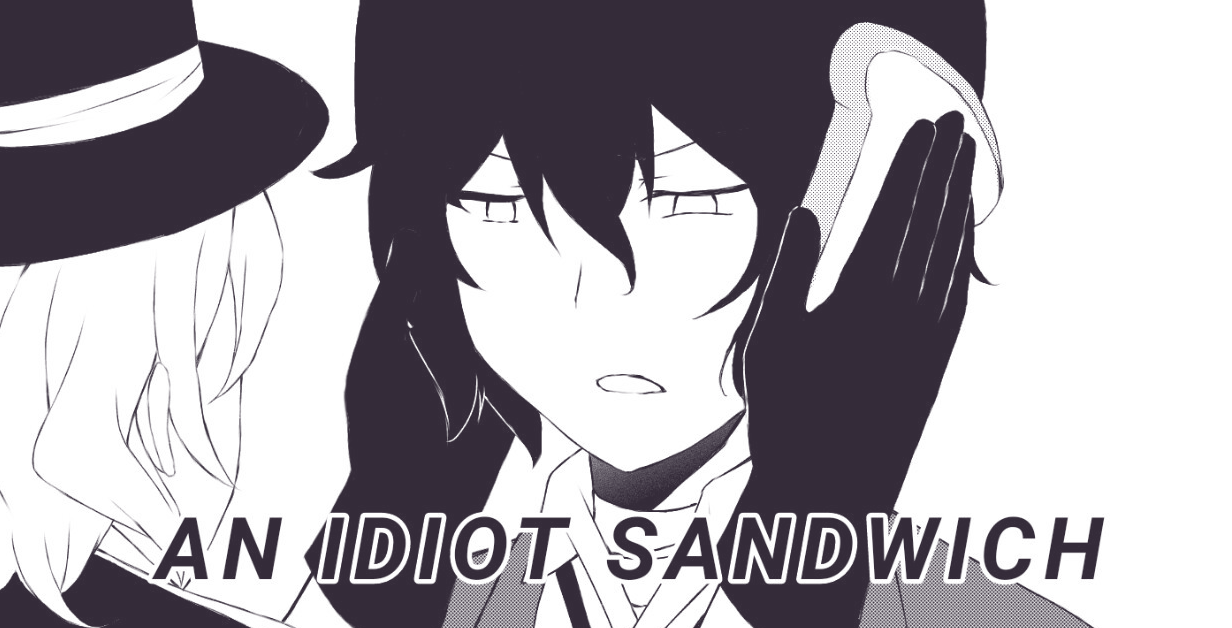
Reality and Reversal
in real life, Dazai Osamu, Nakahara Chuuya, and several other authors collaborated on a small literary magazine, The Blue Flower, that released only one issue before the members dispersed. to give an idea of their group synergy, Dazai himself described the affair as "crazed, directionless frenzy." i imagine that his contentious relationship with Chuuya was partly to blame. to begin, Chuuya was a violent and unrepentant alcoholic, already strong-headed but borderline sadistic while drunk. evidently he spared his junior author none of the torment. for Dazai, hypervigilant of and oversensitive to others' opinions, this was tantamount to torture. it only made matters worse that they always met in bars.
after the Blue Flower group disbanded, Dazai openly criticised Chuuya to the rest of the literary world. otherwise, he avoided him. but once it was safe, in a bold move, Dazai claimed Chuuya's appearance wouldn't change whether he was dead or alive upon hearing the news that, at age 30, he had succumbed to tubercular meningitis.[2] to put it lightly, they didn't work well together.
as a consequence, in Asagiri-verse the hostility remains but swaps the role of the firebrand and the burned. it should be noted that the fictionalised Chuuya is pretty mellow at his core, yet Dazai never fails to get a rise out of him. this is due in part to his well-timed, knife-sharp jeers. more than that, though, their long history and the sibling-like nature of their relationship requires the sort of back and forth taunting that makes your eyes roll. more on that later.
another reversal is seen in their potential as teammates. while the Blue Flower group barely scrounged up a magazine, Soukoku are out here getting shit done— literally leveling buildings. years after their disbandment, the legend of their unbeatable partnership lives on in the criminal underworld. of course, this will also be discussed further, but not just yet.
World
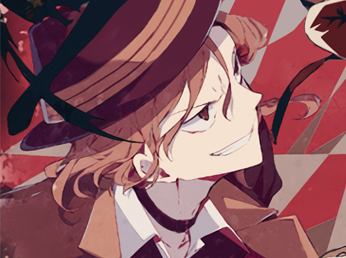
History
first, let's establish some basic ideas about the world of Bungou Stray Dogs. in this universe, a small number of people are blessed with supernatural talents known as gifts, skills, or abilities. throughout this document i will use the names interchangeably. moving on: abilities vary widely in their expression, from clairvoyance to illusions to pocket dimensions and beyond. typically, Gifted are born with their talent, though at least one ability was seen transferred between mother and daughter in childhood. it is unknown how or why these powers manifest. what matters is that the world is aware of their existence and the extraordinary potential of ability users, most strongly evidenced by The Great War.
14 years before canon, hostile factions of powerful European Gifted sparked a global conflict. for Japan's part, ordinary humans comprised the bulk of the soldiers because, at the time, the government had yet to weaponise ability users. please, take a moment of consideration. is it not unconscionable that so many lives were lost— millions of families torn apart— because a handful of supernatural creatures couldn't manage a civil conflict? general consensus seems to agree. after the War, a great number of Gifted disappeared from the public eye, abandoning legal employment for underground organisations. at the same time, government research for skill users turned super soldiers began. in the end, a peace treaty was signed, but even with the War's conclusion trauma remains. nothing will bring back the parents of the orphans whose numbers ballooned worldwide.[3]
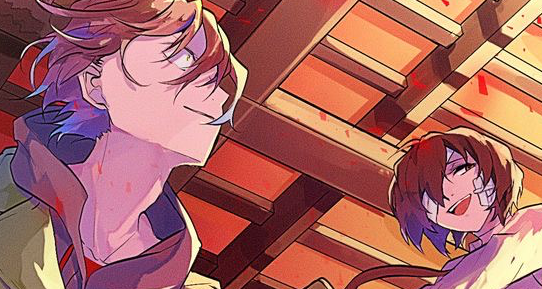
Setting
Bungou Stray Dogs itself is set in a fictionalised version of the real Japanese city Yokohama. in fact, many important locations within the story pay homage to actual structures in the area.[4] one striking difference are the massive skyscrapers looming overhead: a cluster of five sleek, black towers in the center of the city. controlling them is the shell company Mori Corporation, the principal front organisation for an underground system of militant skill users. this is the Port Mafia.
by the same token, we must note Skull Tower, yet another impossibly tall structure hovering on the Yokohama skyline. unlike the Port Mafia's headquarters, however, this tower is long abandoned. its uncanny height is further exacerbated by its rotting neo-gothic architecture, clashing with the industrial district within which it was erected. flanking Skull Tower is Cone Street, a slum built inside the massive crater carved into the city by a certain catastrophe. both are located on one of Yokohama's many offshore settlements— this one known as Suribachi City— connected to the mainland by highway. foreign settlements such as these exist in real life as well. the islands are artificially created to compensate for territory lost to the hills surrounding the city, an area where development is impossible, ultimately forcing people seaward.[5]
as far as divergent history goes, after the Great War Yokohama descended into unprecedented chaos. criminals from all over the world descended upon the city. the result was a violent, lawless era that terrorised civillians and Gifted alike. in an effort to restore balance to the city, power was ultimately split between three groups composed of and headed by ability users: the Special Division for Unusual Powers, the Port Mafia, and the Armed Detective Agency. though by design they uphold clashing worldviews, their mutual dedication to the city's well-being triumphs over all.[6]
for the most part, little else differs from the real Yokohama. as you read the story i am about to tell you, feel free to imagine it as it is in the real world: a bustling metropolitan area boasting all of modern life's conveniences, yet maintaining the resplendent beauty of the seaside. also there are magic people running around.
Plot
THERE ARE SO MANY REDUNDANCIES IN THIS DOCUMENT!!!!!!!!!!!! i'd like to put all the parts of the story where they are TOGETHER into this section. that might entail removing the "history" sections from the profiles altogether. idunno yet. i'll see what i can do.
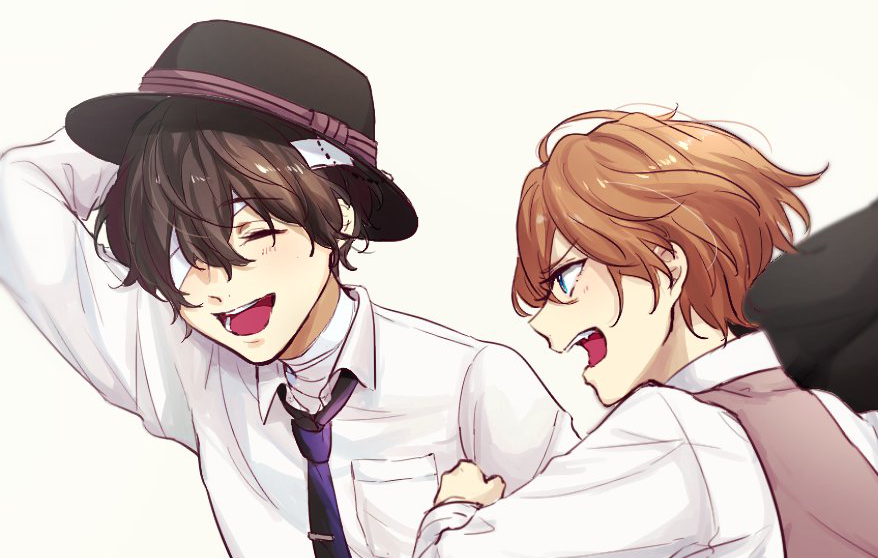
Their Story
seeing how long this page is, you may be surprised to hear that Dazai and Chuuya are not the principal characters of Bungou Stray Dogs. no, the protagonist is one Nakajima Atsushi, who confounds me to no end and henceforth will be mentioned sparingly. in general, i only care about the main narrative when it intersects with Soukoku's story. this happens rarely. for that reason, this timeline only brings in the most relevant outside events.
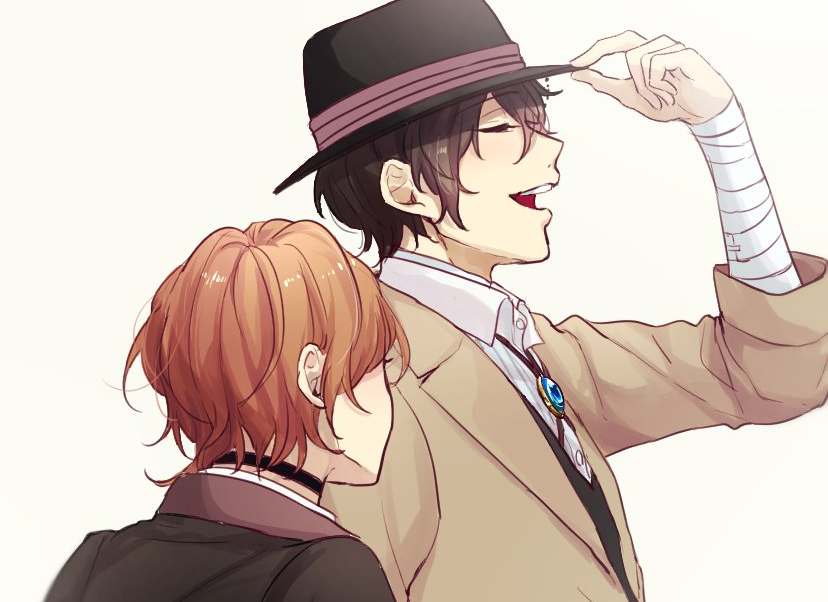
Overview
it is extremely helpful that Dazai and Chuuya are the same age— separated by ~2 months. for this timeline, i will use their birthdays/ages to help things along.
- age 7: Chuuya is born when he merges with Arahabaki. his life together with Sheep begins
- age 8: The Great War ends with a peace treaty; meanwhile Yokohama descends into abject chaos
- age 10: the Armed Detective Agency is established, bringing Yokohama closer to peacefulness in accordance with the Tripartite Framework
- age 12-14: the Port Mafia's boss, Mori's predecessor, turns senile and disrupts the Framework. he destroys the city with impulsive decisions
- age 14: Dazai watches Mori assassinate the Old Boss and overtake his position; presumably, he is hanging around the Port Mafia much of the time
- age 15: Dazai and Chuuya cross paths and work as partners for the first time. Dazai officially joins the mafia and, as instructed by Mori, threatens to kill Sheep unless Chuuya joins, too
- age 16: Yokohama's criminal underbelly once again overflows with senseless violence. Dazai and Chuuya put a stop to it all when they obliterate three enemy organisations in a single night. henceforth they are known as Soukoku; in the same year, they are both promoted to executive status in the mafia, becoming the youngest members to ever achieve such heights
- age 18: Dazai defects from the mafia to fulfill his friend Odasaku's dying wish, planting a bomb in Chuuya's car on his way out as a goodbye present. Chuuya uncorks the most expensive wine in the world to celebrate
- age 18-20: Dazai effectively disappears to recollect himself. Chuuya's specific whereabouts also unknown, but it's assumed he's still working under Mori
- age 20: Dazai joins the Armed Detective Agency, so now he and Chuuya are enemies for realsies
- Dazai allows himself to be captured by the Port Mafia as part of a larger plan. Chuuya makes his first appearance in canon when he beats the shit out of Dazai in the dungeon. this is their first meeting in 4 years
- during a rare truce between the Detective Agency and the mafia, Soukoku are called upon to take out a particularly tough enemy. Chuuya has no choice but to use Corruption for the first time in years. luckily Dazai rescues him from burning up from the inside out just in time
- ...that's it. that's literally it. i don't think there are any other SKK chapters OMG??????
pre-canon
prequels
main work
everything in the main storyline takes place when they are 22 years-old, so i'll just do regular bullet points for these.
Dazai
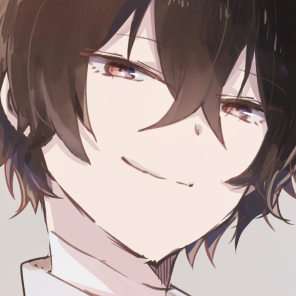
black hole in the shape of a man
"There's a saying among the Port Mafia...
The biggest misfortune for Dazai's enemies is that they are Dazai's enemies."
he is gifted with No Longer Human, named for the real author's semi-autobiographical novel. it is a nullification ability that cancels the gift of anyone with whom he shares skin contact, lending him a unique advantage in conflicts between skill users. on top of that, he's a certified genius. all things considered, he should be a widely sought-after weapon for Gifted warfare... but in reality? anyone looking to use him for their own aims will end up manipulated by him instead.
first things first. where personality is concerned, one thing must be understood: Dazai is easily bored. contemplative by nature, his early quests for self-actualisation hit a wall of nihilism, now barring him from the most basic enjoyment. at this point he sees no meaning in life at all. be that as it may, his wish for a painless death causes him to abort all suicide attempts halfway through, thus shackling him to misery from which he cannot escape.
his only reprieve from futility is tormenting others. no one is safe from Dazai's taunting, not his superiors, not his friends— not even those who pose a credible threat to his life. he loves to play pranks on his coworkers; enter and win outrageous bets; freeload upon the good-natured; show up late or not at all; and generally cause problems on purpose just to see what will happen. this pairs nicely with his lackadaisical nature. unless it personally interests him, he avoids work at all costs regardless of the consequences that rain down on others.
rest assured, Dazai only does exactly as he pleases. being a genius has its perks, especially the ability to manipulate people and circumstances to one's benefit. whatever end he chooses, whether it's ice cream for dinner or an enemy dead at his feet, he always finds the means to get what he wants at the lowest cost to himself. he is the king of lying, cheating, and stealing with a smile, forever 12 steps ahead with 10 escape plans on top. it's not that he's ignorant of his poor behaviour— far from it. more aptly put, he just doesn't care.
based on evidence from No Longer Human, the lying and pestering compensates for the emotional void within him. an aberrant personality— cold, secretive, egocentric, sadistic— precludes genuine human connection. despite his genius intellect, nothing in his mental arsenal lends access to intimacy. in other words, Dazai's only tool for building relationships is an elaborate game of cat and mouse where he provokes an emotional reaction from his target. sad as it is, this is his best chance at influencing others. it's only a mockery of intimacy... but what more can he ask for? not much is lost considering his compulsions for obsfucation, for reclusion, for burying his secrets and shutting everyone out. Dazai gets everything he wants. everything except someone to love him.
pull back the black curtain on my past
nothing is known of Dazai Osamu's life before age 14, where he suddenly appeared under the tutelage of the former army doctor Mori Ogai, now head of the Port Mafia. i speculate he was yet another child orphaned by the Great War— but more on that later. to satisfy his own ends, Mori made Dazai a witness to the assassination of the former boss and forced him to testify to the veracity of Mori's succession. this was particularly advantageous considering Dazai's long-standing death wish. should he finally succeed at killing himself, the liability of truth would die with him. unfortunately Dazai continued to live. Mori, making the best of the situation, chose not to dispose of him and instead groomed him for future leadership. his formal induction to the Port Mafia began at age 15 when he was tasked to investigate a rumour in exchange for a guaranteed suicide method. this investigation set him on the path to meeting Chuuya. their union changed his life forever.
following the successful investigation, Dazai was immediately promoted to lead his own military squadron. alongside his usual cunning, he used this leverage to force Chuuya into the Port Mafia as well, where they ended up working closely together. few could have predicted how devastatingly powerful their partnership became. by age 17, both were ranked among the top brass, making them the two youngest Port Mafia executives in history. nicknamed The Demon Prodigy, criminals all over Japan feared and renowned his merciless tactics. by the time he was 18 years old, he was the biggest bankroller in the Mafia. but evidenced by his sparsely decorated office,[7] neither fame nor fortune appealed to Dazai in the slightest.
"Be on the side that saves people. If both sides are the same, then choose to become a good person. Save the weak, protect the orphaned. You might not see a great difference between right and wrong, but... saving others is something just a bit wonderful."
above all, Dazai fears his own worthlessness. he managed to escape the hell of self-pity by joining a humanitarian cause with the Armed Detective Agency. still, he is unhappy. still, his bloodstained past haunts him. during his adolescence in the Port Mafia, his only will to live was a desire for violence— witnessing it, inflicting it, commanding it— and like all things he found success in it. 136 murders, 312 cases of extortion, 625 cases of fraud, along with various and sundry other crimes. [CITATION] these are Dazai Osamu's documented offenses. as such i cannot begin to imagine the depth and breadth of his true criminal history.
Chuuya
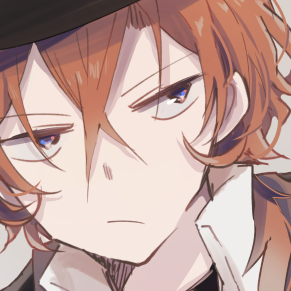
Grudge Bearing Son of God
Lorem ipsum dolor sit amet, consectetur adipisicing elit, sed do eiusmod tempor incididunt ut labore et dolore magna aliqua. Ut enim ad minim veniam, quis nostrud exercitation ullamco laboris nisi ut aliquip ex ea commodo consequat. Duis aute irure dolor in reprehenderit in voluptate velit esse cillum dolore eu fugiat nulla pariatur. Excepteur sint occaecat cupidatat non proident, sunt in culpa qui officia deserunt mollit anim id est laborum.
government experiment gone rogue
"Nakahara Chuuya" is nothing more than a human name assumed by the ancient god of calamity, Arahabaki. understood only as a mysterious power source, the Japanese government seized Arahabaki with intent to artificially manufacture an army of Gifted. however, during a breach of the research facility, it escaped confinement and destroyed the lab, raining further hellfire upon the city until it merged with a 7 year-old test subject. that child was Chuuya and this is the origin of Cone Street. the slums where he grew up were built in the wreckage of his explosive birth.
the Chuuya we know and love has no memories of a human life before this incident. from his perspective, he is simply an extra-dimensional being pulled forcefully into this strange, often cruel world. at times he finds it hard to consider himself human. of course, as a child Chuuya had no way of knowing exactly what he was, just that he was Gifted, powerfully so. and on top of that, different. identity crisis notwithstanding, Chuuya used his power to the fullest, foremost in service to his family: Sheep. regarded as hoodlums by most, Sheep was a gang of orphaned and impoverished Yokohama children who banded together to survive. when Chuuya stumbled into the world with nothing— no family, no past, and nowhere else to go— they welcomed him as one of their own.
keep in mind that Chuuya's acceptance into Sheep coincides with the end of The Great War and the escalation of violence in Yokohama. by definition they had no adult members and, as ordinary humans, very few means to protect themselves. Chuuya changed everything. with his extraordinary gift to manipulate gravity, he became Sheep's sword and shield, crushing their enemies one by one. their territory expanded and ultimately enveloped all of Cone Street. alongside that came notoriety, legend, rumour, and by outsiders Chuuya was named The King of the Sheep.
he rejected the moniker at every turn. not only was it technically false, seeing as a 12-member council democratically oversaw Sheep's major decisions, he never wanted to lead in the first place. in the end the choice was made for him, not by the children who depended on him, but by the power pulsing in his veins. the council's every decision needed his backing. if they wanted to strike down an enemy, Chuuya was their one-man army. if they wanted to retreat from a conflict, Chuuya's errancy could obliterate the treaty. in fact, with minimal effort he could kill any of their members at any moment. there is no doubt that Sheep's very lives depended on their ability to possess and control Chuuya.
luckily for them, Chuuya very easily allowed himself to be possessed and controlled. just as Sheep wielded him as a weapon of self-aggrandisement and -protection, Chuuya clung to them for his own needs. together their camaraderie and helplessness gave him a sense of belonging and purpose. of course it was smothering to be the sole protector of so many little lives, especially when a disagreement with friends ended in guilt trips and threats of abandonment, but what choice did he have? leave Sheep and wish them all a swift death? ruing the thought, Chuuya continued to sacrificed his autonomy for their safety. in return, he got to have a family.
all of that changed when Sheep made the first move: in broad daylight, guided by a lifelong friend, a blade coated in rat poison sunk into Chuuya's stomach. according to Sheep's council, they all agreed to cut their losses, to kill him before he rebelled. of course, the godly vessel Chuuya survived. at the same time, he lost his family to betrayal. in a desperate barter to save their lives, while clutching the still-bleeding wound from their assassination attempt, he promised to join the Port Mafia. thus begins his life by Dazai Osamu's side.
